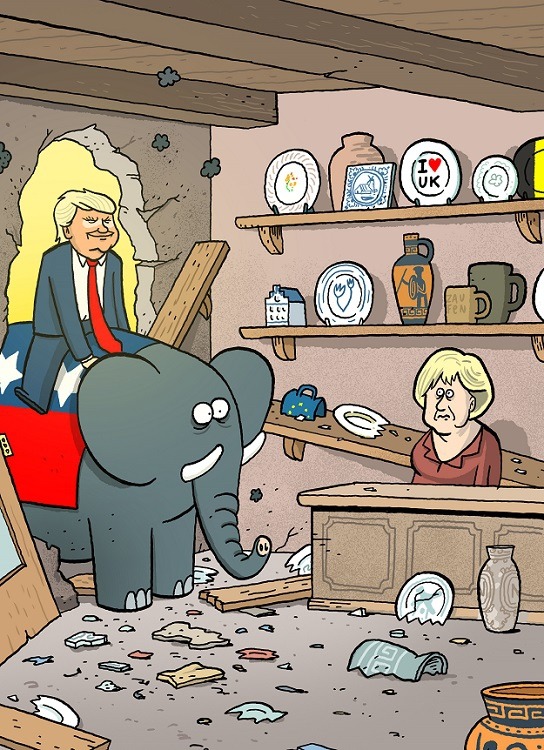“For many decades, we’ve enriched foreign industry at the expense of American industry; subsidised the armies of other countries, while allowing for the very sad depletion of our military. We’ve defended other nations’ borders while refusing to defend our own….
From this day forward, it’s going to be only America first, America first. Every decision on trade, on taxes, on immigration, on foreign affairs will be made to benefit American workers and American families. We must protect our borders from the ravages of other countries making our products, stealing our companies and destroying our jobs.”
Donald Trump’s inauguration speech was poorly written and badly delivered. But the new US president’s message was crystal clear. Trump intends to govern as he campaigned – as an authoritarian, xenophobic, protectionist nationalist. That has potentially catastrophic consequences for the world – and for Europe in particular.
Those of us fortunate enough to have been born in Western Europe since the Second World War have experienced only a particularly benign and stable form of international order. A liberal order – based on international rules and institutions, as well as consensual security alliances, liberal democracy, openness and shared liberal values – underpinned by enlightened American hegemony. US leaders believed in a positive-sum world where providing global public goods, such as open markets and regional ones, such as security guarantees for European allies, benefited the US as well as others. While of course this liberal order has always been imperfect and incomplete, it is still by far the best international system ever.
European integration has been encouraged and supported by the US as a key part of that liberal order. From the very start in the 1950s, wise US statesmen saw a more united Europe both as a vehicle for peace and prosperity and as a valuable ally. Even when Americans and Europeans had their differences – over trade, the wars in Vietnam and Iraq, and much else – that commitment never wavered. After the fall of the Berlin Wall, the US supported the reunification of Germany and then the EU’s eastward expansion. Last year, President Barack Obama did his best to discourage Britons from voting to leave the EU. So, while many Europeans may have mixed feelings about American power and disagree with particular decisions of various US administrations, that commitment to Europe is undeniable.
But now the US has elected a president who despises liberal values, liberal democracy and the liberal world order that his wiser, broader-minded predecessors created. Trump believes in a zero-sum world where America is stupid to be bound by rules and institutions and should instead use its clout to screw a better deal out of weaker powers, including longstanding allies. His America First agenda threatens to transform the US from the guarantor of international order into the biggest source of global instability and conflict.
Trump endangers Europe’s economy, politics and security. To be fair, some of Trump’s economic plans may have a positive impact. He wants to cut taxes and increase infrastructure spending, and such a fiscal stimulus would likely boost US growth and drive the dollar up (and thus the euro down). Both those things would boost EU exports. But Trump’s policies are also likely to lead to higher interest rates, both in the US and globally. That will make life tougher for highly indebted European economies.
Where Trump could do most economic damage is on trade. He wants to use tax measures and import tariffs to encourage American companies to produce more domestically and consumers to buy American, and thus reduce the US’s trade deficit. Since the US has a huge trade deficit with the EU in general and Germany in particular, the EU is likely to be in his line of fire. Trump’s protectionism would surely spark retaliation from China, the EU and elsewhere. A trade war would depress already weak growth in Europe; if it gets really nasty, it could provoke another recession.
By acting as one in trade matters, the EU is the US’s equal – and the threat of a trade war and a fracturing of the global economic system strengthens the case for a divided Europe to stick together. But that is all the more reason why Trump will want to encourage EU disintegration.
Let’s be clear: Trump is not indifferent to the EU, he is hostile. He celebrates Brexit. He looks forward to other countries leaving too. Just after his election victory, Trump was pictured grinning in front of the gold doors of his Trump Tower apartment with leading Brexiteer Nigel Farage, the UK Independence Party MEP and former leader. So, instead of playing a constructive role in the upcoming Brexit negotiations, he will no doubt be urging on hard-line Brexiteers. He has already promised that a post-Brexit Britain will be “front of the line” for a trade deal with the US – albeit on Trump’s terms.
Trump’s European allies are not German Chancellor Angela Merkel and European Council President Donald Tusk, but far-right, anti-EU extremists such as Marine Le Pen of France’s Front National. His victory also makes the prospect of a President Le Pen seem less aberrant; if the Americans can elect “the Donald”, it seems less absurd that the French could choose Marine.
Trump’s retreat from America’s international commitments and the return to great power politics has particularly alarming consequences for Europe’s security. In foreign and security policy, the EU is weak, divided and scarcely willing or able to exercise military power.
Since the end of the Cold War, Europeans have grown used to living in a postmodern la-la land where order and security have been taken for granted. The conceit was that the rules of geopolitics had been rewritten: the EU model of a rules-based system reliant on the attractions of economic integration and political soft power rather than military might would dominate the twenty-first century.
Yet Europe is surrounded by threats: unstable regimes to its south and east, Islamic State terrorists in Syria and Iraq, with many followers within Europe, and President Vladimir Putin’s revanchist Russia. Putin has invaded his neighbours, sought to redraw borders by force and wants to destabilise, divide and ultimately destroy the EU by waging cyberwar, funding anti-EU extremists and spreading lies on social media.
Now Trump has declared NATO “obsolete” and cast doubt on whether he would defend America’s European allies. It’s even more troubling that he never criticises Putin – and that a deal between them would doubtless be at Europe’s expense. What Putin craves is America’s recognition of Russia’s superpower status and acceptance that its neighbourhood falls within the Kremlin’s sphere of influence – which could stretch as far as the old Warsaw Pact did, or even beyond.
That has economic implications as well as security ones. How secure are investments in central and eastern Europe? Since all three Baltic states are in the euro, how might Russian destabilisation and aggression affect eurozone financial markets? Remember how quickly Ukraine’s economy and public finances deteriorated after Russia’s invasion. And should Europe really be so reliant on Russian gas?
On the plus side, increased defence spending across Europe might serve as a fiscal stimulus. And in principle, a common external threat could foster closer EU cooperation on security and defence, and even politically too.
But the EU is deeply divided on Russia. Many governments prefer to appease Putin than stand up to him. Some openly champion him. Many Germans are tempted by a special relationship with Russia. Both leading candidates for the French presidency – Le Pen and François Fillon – are pro-Putin. And the country that takes the hardest line against Putin – the UK – is now set to leave.
The EU is wholly unprepared for the geopolitical earthquake that Trump is generating. Its economy is feeble, its politics polarised and its defence wholly inadequate. Worse, the political establishment in Brussels and national capitals is often narrow-minded and complacent – and is widely seen as incompetent, self-serving, out of touch and corrupt. The risk of the EU disintegrating has never been greater.
By Philippe Legrain
Trump and the EU: Recipe for disaster?
This is an opinion article by an external contributor. The views belong to the writer.


